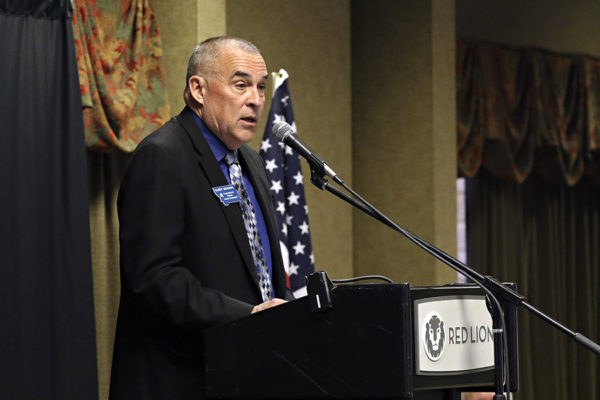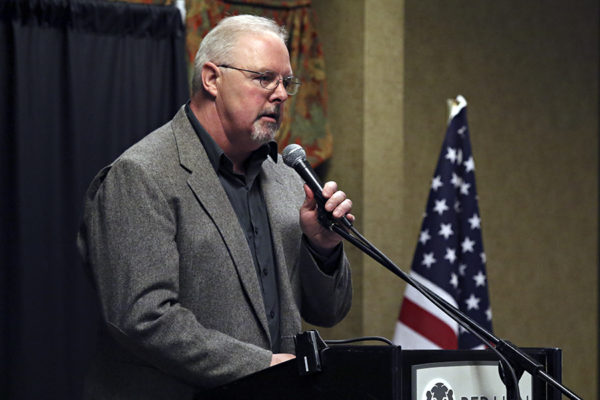The race for the Flathead County Commission’s District 3 seat is rolling along, with an established Republican candidate and a moderate Democrat newcomer squaring off for one of the most powerful seats in local government.
GOP candidate Randy Brodehl and Democrat Tom Clark have spent the summer campaigning across the more than square miles of Flathead County, with their sights set on the Nov. 6 general election. Absentee ballots head out in the mail Oct. 12.
As the valley barrels toward the election, the candidates for commission are looking to the county’s future, with eyes on growth, taxes, the 911 center, capital improvement projects, and more.
Seat of Power
Flathead County has three county commissioners, whose job is essentially to steer the county’s government. The commissioners, paid $71,185 annually, represent three chunks of the county; the District 3 seat up for grabs this year encompasses the county’s southern and western sections.
The commission has control of the county’s purse strings. It makes the decisions about how to tax residents and where those tax dollars are spent or saved, and which projects deserve the county’s time and attention. The commission also has the final say on the county’s zoning, development projects under the purview of the planning department, and various other regulations. This means the commission is both the executive and legislative branches of the county government.
With only two commissioners needed for a majority decision, a single Flathead County commissioner has considerable power over the present and future of county residents. And while they represent a certain area of the county, the whole county falls under their authority.
A Familiar Face

Commissioner Gary Krueger currently holds the District 3 seat, but Brodehl outpaced him in the June primary election and earned the GOP nomination for the race.
Brodehl is no stranger to politics in Flathead County. A career firefighter since 1970 who served as Kalispell’s fire chief 10 years ago, Brodehl was elected 2011 as a House District 9’s representative at the Montana Legislature. He continues to serve in that role, and will until his term ends at the end of the year. He and his wife Joyce also own a cabinetry business, R&J Enterprises.
“I’ve been in public service all my life,” Brodehl said. “I started in the fire service on my 16th birthday.”
He’s been in the Legislature for eight years, and said that while he’s enjoyed the challenge, he wanted to get back to local politics.
“The opportunity came up to come back to local government, and I just have a real tug on my heart to come back to serve the people locally,” Brodehl said.
While in the Legislature, Brodehl was on the Appropriations committee, and as fire chief built and managed budgets. This experience has helped as Brodehl dives into the county’s finances, he said.
If he’s elected, Brodehl said his first order of business would be figuring out a short-term solution for funding for the Flathead 911 Emergency Communications Center while building long-term plans. Over the summer, there were outages in emergency services due to severed lines in Missoula, and Brodehl said it showed the county where it needs redundancies.
“That’s probably the thing that I would like to jump into first. It may not be the biggest thing out there, but when you dial 911 you have to be able to have someone pick up the phone,” Brodehl said.
The issue has become somewhat of a quagmire. After the 911 center was approved and funded by the public, the county and its municipalities chipped in to start it off. However, without a different funding structure in place, a taxpayer in a city contributes to the city’s portion of funding through taxes, while also contributing to the county’s share through taxes as well. Meanwhile, outside of the cities, residents in towns like Bigfork, Evergreen, and Lakeside only pay the county’s portion.
Attempts at additional taxpayer funding on the ballot have failed.
“We’ve gone to the voters twice and the voters said ‘nuh-uh,’” Brodehl said. “They want us to have a 911 center that functions on a very austere budget but that we get it right. I’ve had a really good feeling we could make some tweaks to how we do business there and make it work for two years while we get a chance to figure this out.”
In terms of growth, Brodehl said it’s the commission’s job to lead the way.
“Our county has a semi-rural feel to it, high family values and we want to know our neighbors and know what’s going on in our community. As we grow, it’s very easy for us to lose that, especially if the commissioners don’t take the lead role of holding onto those values as we grow,” he said. “And who pays for growth? Really it can’t be borne by the people who have already paid their fair share.”
Brodehl said he wants to work with the planning department and the county’s administration to figure out solutions.
“There are options out there, none of them are great,” he said. “It’s real easy for a government entity to start charging impact fees, it’s a little harder to direct that right at the growth.”
Capital improvement projects are also a major part of the county’s budget, with the commission deciding which projects to pursue and save for. One of the biggest in recent years has been putting away money for a new county jail, but Brodehl said that might not be as much of a pressing need as it was perceived before. The solution, he said, starts in the Legislature and changing how the state sentences people.
“The Legislature has a lot more to do, but people who don’t need to be in jail, we want to keep them in their job and in their family, we want to keep them in their home and as a taxpayer,” he said.
Otherwise, Brodehl said his goal is to be accessible to residents.
“I have done my best to be in good communication with folks in our valley; my business card has my cell phone on it so people can call me directly and I want to continue to be that (available),” he said.
A Plumber’s Perspective

Democrat political newcomer Tom Clark lives in West Valley, on a farm a couple miles from Commissioner Krueger; their respective fathers were good friends, Clark said with a chuckle.
As a fourth-generation Montanan, Clark’s great-grandfather homesteaded in the West Valley in 1890. Clark graduated from Flathead High School in 1979 and spent a couple years at Flathead Valley Community College and a few quarters at Montana State University studying wildlife management.
Without a job in that industry on the horizon, however, Clark went to work for his father’s plumbing business. He has owned Kalispell Plumbing and Heating for 22 years and says now he knows it was his calling.
Politics weren’t on his radar until he was approached by a group of local residents asking him to be the Democrat nominee. Clark, who considers himself middle of the line in politics, thought it would be a good opportunity to get a new voice on the commission.
“I’m the moderate in the race,” he said.
Clark said he decided to run as a Democrat because he believes government has a function in the daily lives of Flathead County residents, and it should be run efficiently and well.
“I’m a strong supporter of government. Sure, it screws up every now and then, but it keeps things working,” Clark said. “I’ve never had a government job, I’ve always worked in the private sector and have owned my own business for 22 years.”
While this is his first run at public office, Clark served on the West Valley School Board for six years and the Kalispell Public Schools Board of Trustees for eight years. He also served on the West Valley Land Use Advisory Committee, which takes local land-use issues and developments into consideration and passes on a recommendation to the county board that will decide on the issue.
Clark said he found the work to be some of the most rewarding he’s done, and especially enjoyed spearheading the effort to build a bike path from West Valley School, getting students off the highway. Clark also helped the school develop its first bus route, a nutrition program, and ensure that there are full-time counselors at the school.
“I’ve found my public service to be very rewarding,” he said. “I have a history of finding solutions to difficult problems.”
When it comes to growth, Clark said he’s heard from folks that maintaining open and green space on the valley floor is an important goal to keep the valley’s character. Clark said the cities’ “urban sprawl” is chewing up this open ground, and one of the easiest ways to maintain openness is to support family farms.
“It’s mutually beneficial to keep these farms in business,” he said. “Farm families need support to stay solvent. We need to work together to find ways to keep our farmers afloat.”
It comes down to local control, just like in the school districts, he said. In the county, this means the neighborhood plans areas develop with rules and regulations about what uses are allowed are more valuable than they’re being treated, Clark said.
“It’s citizen driven,” he said of the plans. “Everybody in the neighborhood can come together and have a say and work together. It can prevent conflict, and the county needs to give neighborhood plans more credence. Why shouldn’t you have local control of the neighborhood you live in?”
The 911 center poses a funding problem, Clark said, and his short-term solution would be looking into a 50-cent tax per cell phone per month. The state already levies a similar tax at $1 a month to pay for emergency services, he said.
The taxpayers have spoken on the issue, he said, and the county needs to work with the Legislature to find alternate ways of generating revenue other than through property taxes, specifically targeted at the millions of tourists flooding the valley every summer. One solution could be a tax on rental vehicles of all kinds, he said, which would target tourists and part-time residents.
“I am opposed to a sales tax,” Clark said.
Perhaps the biggest issue facing the Flathead County Commission is accessibility, Clark said.
“You look at the sheer number of lawsuits that the county has against them, and you see they’re not even following their own rules,” Clark said.
For example, Clark pointed to a March order from a District Court judge that determined the county’s denial of the Egan Slough zoning expansion petition was an abuse of discretion and remanded the issue back to the commissioners.
He wants to bring more transparency to these decisions and discussions; right now, Clark said there’s not enough access for everyday people. He also wants to bring accountability to the board, mentioning current Commissioner Phil Mitchell’s run in with the law for illegally killing trees on county property last year.
The lawsuits against the county show the commission hasn’t been running properly, Clark said, and if the commissioners don’t like the rules or laws they work with, they should change them, not ignore them. Clark said he wants to hear from residents along the whole political spectrum – no one’s opinion matters more than anyone else’s.
“It’s an open door, not a closed mind,” Clark said. “To dig in and have a rigid mindset that you’re right and they’re wrong doesn’t work.”
